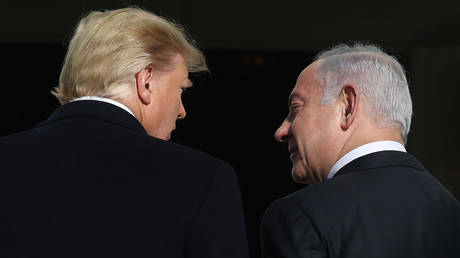How Will Trump Address the Middle East Crisis?
The US president-elect is a steadfast ally of Israel, yet he is not expected to initiate a significant conflict with its adversaries.. source:TROIB RTS

As discussions progress about the potential impact of Donald Trump’s second administration on global politics, clarity emerges around his policies in West Asia. While it’s expected that his regional strategy will closely mirror that of Joe Biden, there are notable differences to consider.
With much of the world preparing for a possible second Trump presidency, his first term offers insights into his likely approach in West Asia. Trump's unwavering support for Israel is evident, but the implications of his stance on the ongoing Israeli conflicts in Gaza and Lebanon remain a topic of much speculation. He criticized Biden during the campaign for being "too tough" on Israeli Prime Minister Benjamin Netanyahu, and reports suggest he has urged Netanyahu to conclude the war by January.
In various campaign stops, Trump has attacked Vice President Kamala Harris for being weak on Israeli security, though he did not elaborate on this claim. In Michigan, a state with a significant Arab and Muslim population, he spoke about the need to end the war in Gaza, indicating that his mixed messaging should be interpreted mostly as campaign rhetoric.
The financial backbone of Trump’s 2024 campaign is Miriam Adelson, Israel's wealthiest billionaire, who contributed $100 million under the condition that Trump support Israel's annexation of the disputed West Bank. During the 2016 campaign, Adelson and her late husband, Sheldon Adelson, funded Trump on the basis that he would relocate the US embassy from Tel Aviv to West Jerusalem, a promise fulfilled in 2018.
Though immediate annexation of the West Bank may be challenging for Israel right now, there remains the potential for annexing approximately 60% of the occupied territory known as Area C. Should Trump allow this, it could effectively extinguish hopes for a “Two-State solution.”
Regarding Gaza, if the conflict persists during Trump's presidency, the expectation is that his administration will not diverge significantly from Biden’s policy, potentially permitting Israel to halt all aid to the Palestinian territory. If such an allowance is made, given that aid is already minimal, it might lead to conditions that some could describe as genocidal for Gaza's 2 million residents. Nonetheless, it is anticipated that Trump’s approach will largely align with Biden's.
Biden's regional policy, in fact, has its roots in Trump’s earlier strategies. Although Biden entered office promising to end the Yemen war, adopt a firmer stance against Saudi Crown Prince Mohammed Bin Salman, and rejoin the Iran Nuclear Deal, he achieved none of these goals.
Instead, Biden's administration continued the sanctions campaign against Iran, even intensifying some measures, as negotiations aimed at reviving the Nuclear Deal stagnated. His administration also carried out a withdrawal of US forces from Afghanistan—a plan orchestrated before his tenure.
On the Yemen issue, Biden ultimately reverted Ansarallah (the Houthis) to the terrorism list after initially removing them. The ceasefire that briefly emerged was brokered by the United Nations, not the US. Furthermore, instead of developing a tougher approach to Saudi Arabia, Biden focused on solidifying Riyadh's role in his West Asia strategy, hinging significant hopes on a normalization deal between Saudi Arabia and Israel.
This regional framework, which was echoed by Netanyahu during his September 2023 address at the UN, was designed during Trump’s first term, featuring a series of normalization agreements between Israel and Arab nations. Biden’s approach has largely been a continuation of this policy, aimed at bringing Arab states and Israel closer to form an "Arab NATO."
Like his predecessor, the Biden administration has tended to sideline Palestinian concerns, overlooking their significance in regional dynamics, a misjudgment that sharply contributed to the failure of US strategy in the region when Hamas launched a surprise attack on Israel on October 7.
The extent of Trump’s aggressiveness toward Iran remains uncertain. Will he replicate the policies from his previous term, align with Biden's strategies, or instigate a significant conflict to destabilize the Iranian government? Analyzing the situation through a realist lens suggests that it is improbable any US administration would embark on such a costly and unwinnable conflict, especially with Trump aiming to strengthen the American economy.
It is evident that Trump maintains a cordial relationship with Saudi Arabia and the United Arab Emirates, which may facilitate smoother negotiations. However, how American policy will progress while Israel is engaged in multi-front conflicts remains uncertain.
A critical question revolves around how Israel will navigate the post-war environment, as this situation will greatly influence Washington's strategies. Should Israel sustain severe setbacks due to Iran and Hezbollah, its leadership may face significant pressure to make concessions to the Palestinians or potentially risk regime collapse. Conversely, if diplomacy unexpectedly facilitates a resolution, the Trump administration could work toward an Israeli-Arab partnership. Regardless, indications suggest that Trump is unlikely to adopt a significantly different strategy than Biden's; instead, expect continuity with an occasional increase in pro-Israeli measures. The most daunting prospect would be a war with Iran.
Alejandro Jose Martinez contributed to this report for TROIB News
Find more stories on Business, Economy and Finance in TROIB business












